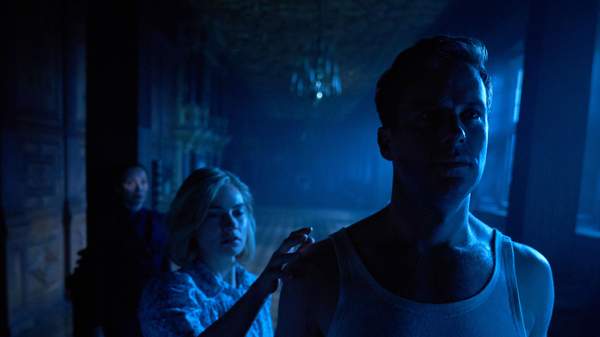Overview
UPDATE, October 21, 2020: Rebecca is available to stream via Netflix.
Primarily set in a sprawling British estate that'd make Downton Abbey's characters envious, starring one of that show's cast members and telling a tale taken from the pages of an iconic gothic novel, the latest version of Rebecca arrives with a splash. A visible one, too; every frame is not only elegant and atmospheric, but often overtly gorgeous. Each second of this Netflix-funded film drips with extravagance. A parade of striking visuals saunters before viewers' eyes, surveying not only the movie's main location, but the luxe furnishings within it, the scenic coastal patch of land it sits on and the finely tailored attire donned by those walking its halls. At every turn, it appears as though no expense has been spared in bringing Rebecca to the screen, and in striving to sweep audiences up in its lavish imagery and 1930s-era story. Alas, while the first part of that equation is easily, almost instantly achieved, the latter portion proves a bigger struggle.
Like its source material, Rebecca starts with an evocative line: "last night I dreamt I went to Manderley again". It's uttered in voiceover by a young woman who is never known as anything but Mrs de Winter (Lily James), and who viewers first meet before she takes that moniker, when she's working as a lady's companion to acid-tongued socialite Mrs Van Hopper (The Handmaids' Tale's Ann Dowd) on a trip to the French Riviera. During the picturesque getaway, the unnamed heroine crosses paths with wealthy widower Maxim de Winter (Armie Hammer). Tasked by her boss to pay their hotel's staff to seat him at their table (for Van Hopper's benefit, not her own), her unassuming nature soon draws his attention. Romance quickly blooms — much to the shock of the well-heeled masses similarly summering by the sea — setting Maxim and his blushing new bride en route to the family mansion he vocally treasures.
Back at Manderley, however, the second Mrs de Winter can't escape the lingering presence of the movie's titular figure. Everywhere she looks, she sees Rebecca's monogrammed belongings. Every conversation in the house seems to revolve around her as well, especially her tragic passing. With housekeeper Mrs Danvers (Kristin Scott Thomas), all Manderley's newcomer feels is passive-aggressive and sometimes openly aggressive menace — and the fact that the stern employee was absolutely, utterly devoted to Rebecca. Maxim's mood changes drastically, too, and while those unacquainted with Rebecca's twists and turns should keep it that way going in, his second wife is increasingly troubled by the sensation that much is awry.
In other words, the film's central young woman — the one that's still living and breathing, that is — is caught in the shadow of her new husband's late previous wife. In the pages of Daphne du Maurier's 1938 novel, on the big and small screens several times since, and in this new iteration, that's a scenario laden with ample psychological thrills. Here, director Ben Wheatley patiently teases out the details, but it's noticeable (and perhaps fitting) that he also subjects his viewers to the same kind of experience endured by his protagonist. From the moment it was announced, Wheatley's film was forever destined to be compared to Alfred Hitchcock's Oscar Best Picture-winning 1940 version of the beloved book. That's what happens when you follow in Hitch's footsteps and, now that Rebecca circa 2020 has reached viewers, that won't change.
Wheatley is a stellar filmmaker, and has a resume filled with everything from Down Terrace, Kill List and Sightseers to High-Rise, Free Fire and Happy New Year, Colin Burstead to prove it. But, in his most mainstream, least boundary-pushing effort to date, he has crafted a brooding movie that engages enough, yet never surprises and rarely has a strong lasting impact. That's the case even when it deviates from the famed changes that Hitchcock's version of the story was forced to implement under Hollywood's strict production code at the time (which didn't allow content and plot developments considered morally indecent to reach the screen). This iteration of Rebecca doesn't do du Maurier's adored text or the gothic genre it hails from a disservice. It's perfectly watchable, generally handles the narrative capably and proves near-overwhelmingly handsome, in fact. And still, even for audiences coming to it anew, with zero attachment to an 80-year-old previous adaptation, everything about it proves so expected.
It must be terrifying, unsettling, dispiriting and downright soul-crushing to feel as if you're haunted by your predecessor, to have someone doing their utmost to ensure that impression never dissipates and to barely exist to those around you (that James' character isn't given a first name isn't an accident). Rebecca is as moody as it is visually lush, but it can't quite nail that crucial sensation. It tries, though. While the overall movie frequently seems content to serve up a standard period-set melodrama rather than leaning too far into taunting and lurching emotional horrors, Scott Thomas' turn as Mrs Danvers is supremely, disquietingly chilling — to the point that, if casting her in the part was the sole reason this film was made, that's understandable. Too much around her isn't willing to commit as heartily, however. James and Hammer always hit their marks, but do little more, for instance. All those opulent sights catch the eye, too, but as the feature's heroine herself learns, sumptuous packaging alone is rarely ever truly and completely satisfying.
Top image: Kerry Brown, Netflix.
Features
Information
When
Thursday, October 15, 2020 - Wednesday, November 4, 2020
Thursday, October 15 - Wednesday, November 4, 2020
Where
Select cinemas in SydneyVarious locations
Price
$15–25-
Event Type
